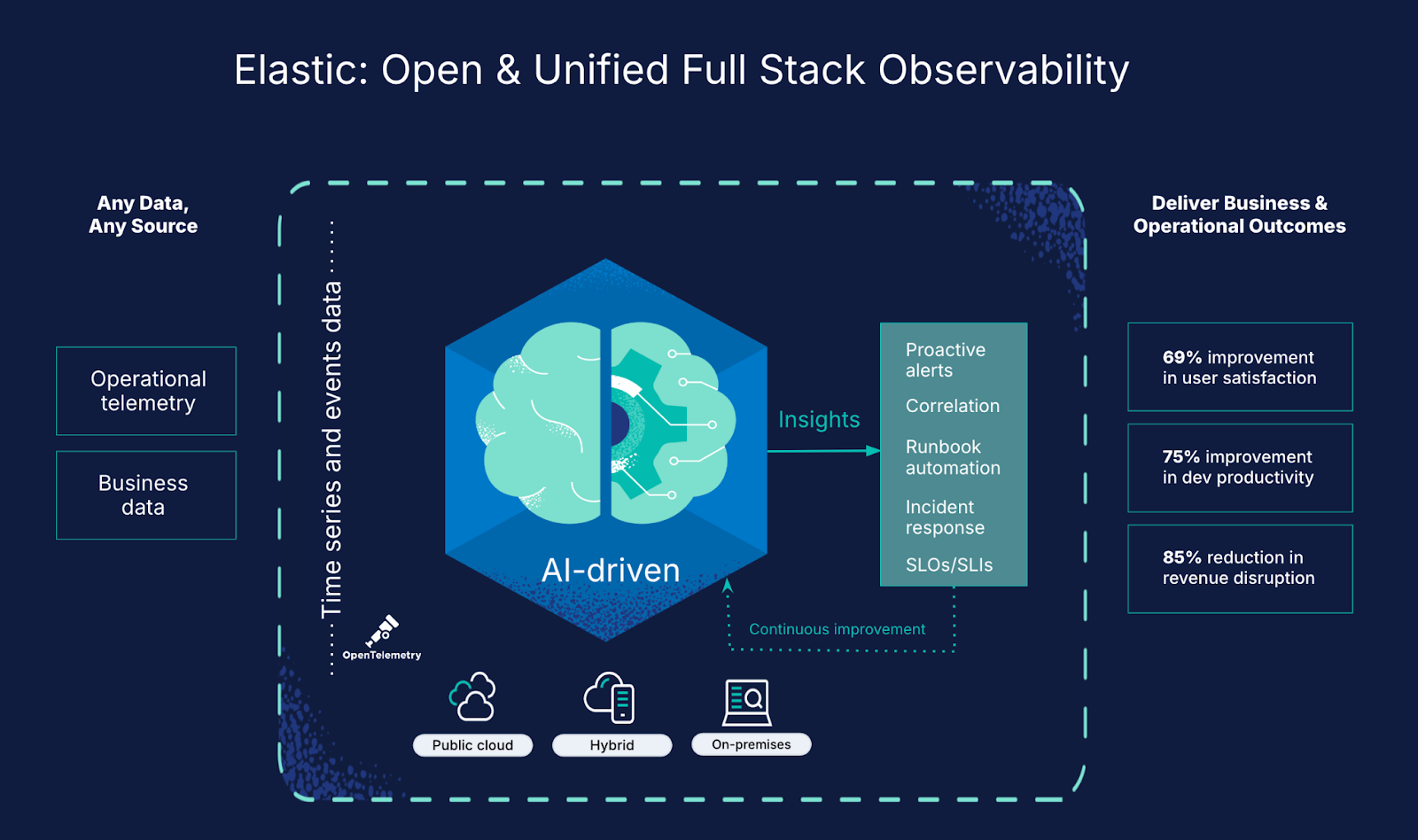Elastic extends Express Migration program for Splunk logging customers

Observability is undergoing a massive shift as enterprises drive adoption of modern technologies, including cloud and microservices, along with disruptive technologies, such as generative AI (GenAI). To keep pace with the complex requirements of the modern tech stack, operations teams need to consider and adopt next-generation observability. Splunk users are often challenged by using products that provide fragmented observability, hampering their ability to modernize their environments.
To accelerate the evolution to a next generation observability solution, Elastic offers the Express Migration program to support migration from Splunk for Splunk logging customers.
The case for next-generation observability
Logs are a ubiquitous signal that is simple to enable, provides visibility into your infrastructure and applications, and is the first go-to signal for SREs and developers. As systems have become more complex, the volume of logs has grown exponentially along with the size and complexity of logs.
A next-generation observability solution must be able to:
Ingest all data, whether operational or business, in a standardized format,
Retain and analyze large volumes of data
Provide comprehensive AI and machine learning (ML) capabilities to proactively identify the root cause faster
The solution should deliver all observability capabilities in a single platform that provides a unified, scalable data store along with the ability to proactively identify issues.
Splunk customers face challenges in modernizing their enterprises due to:
High hardware costs for log data storage
Slow queries and manual intervention for historical data access
Limited and non-integrated ML capabilities
A disparity between on-premises and cloud versions
An inability to correlate between different signal types for root cause analysis due to siloed Splunk products
These issues hinder visibility for teams looking to manage large and complex environments.
Elastic Observability, recognized as a leader in the Gartner Observability Platforms Magic Quadrant, is architected as a next-generation solution. Powered by Elasticsearch Relevance Engine (ESRE), it combines out-of-the-box and custom ML models with secure private data and public large language models (LLMs) to prevent outages through proactive issue detection and resolution. Our unified, signal-agnostic data store correlates operational and business data at an unparalleled scale, providing comprehensive visibility while significantly reducing costs and supporting tool consolidation. With an open OTel-first architecture, Elastic seamlessly integrates with existing technology ecosystems while being extensible to the evolving technology needs, helping to ensure a future-proof observability solution.

Efficiently migrating your logs to Elastic
Migrating your logs to a modern observability solution or even introducing new logs is often tedious, time-consuming, and prone to errors.
Recently, Elastic significantly reduced the effort required to migrate logging by introducing an AI-based capability called Automatic Import (auto-import) to automate the development of custom data integrations, enabling easy and simple ingest of custom data. The combination of Automatic Import and Elastic’s 400+ prebuilt integrations addresses the migration friction associated with data onboarding. Numerous Elastic customers are using Elastic AI Assistant to auto-convert their existing detection and analysis rules in Splunk Search Processing Language (SPL) and take advantage of Elastic’s rich querying capabilities through our powerful new query language, ES|QL.
The Elastic Express Migration program provides incentives on top of these product innovations to accelerate customer migration into the Elastic Search AI Platform with peace of mind and unbeatable ROI. The Elastic Express Migration program is open to Splunk observability customers who are looking to migrate their logging and application performance monitoring (APM) use cases to Elastic Observability.
Get deeper visibility into your GenAI applications with LLM Observability
As GenAI is increasingly gaining adoption, development and operational teams need to understand the performance of the LLMs and related bottlenecks to provide optimal customer experience for their applications. This requires a set of new observability features to support the evolving nature of GenAI applications. As mentioned earlier, Elastic’s auto-import provides the ability to bring in custom logs from these rapidly evolving GenAI applications.
As development teams increasingly leverage GenAI capabilities for their applications, LangChain applications are growing in use. The ability to build RAG-based applications and AI assistants is becoming the norm and making it increasingly difficult to observe these applications. Leveraging OpenLIT instrumentation library, OpenLLMetry, and LangTrace, Elastic Observability can ingest traces and provide visibility with Elastic Observability APM capabilities.
We recently announced the general availability of the Azure OpenAI integration that provides comprehensive observability into the performance and usage of the Azure OpenAI Service. The Azure OpenAI integration collects logs and metrics to provide richer out-of-the-box visibility into the performance and usage of Azure OpenAI-based applications, including request and error rates, token usage, and chat completion latency.
Elastic is here to help
Elastic continues to innovate and deliver customers a future-proof observability solution — one that provides visibility into complex, hybrid environments while supporting new and evolving technologies that enable enterprises to accelerate their modernization.
Interested in our Express Migration program to level up to Elastic? Contact Elastic to learn more.
The release and timing of any features or functionality described in this post remain at Elastic's sole discretion. Any features or functionality not currently available may not be delivered on time or at all. All Elastic Express Migration program benefits are subject to terms, conditions and restrictions, must meet eligibility and other requirements. Splunk and other related marks are trademarks or registered trademarks of Splunk Inc. in the United States and other countries.

